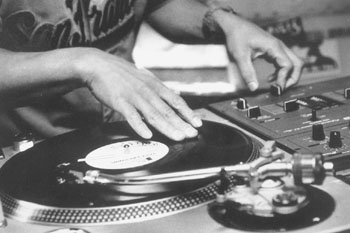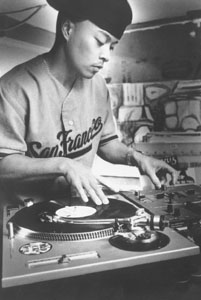Beats Generation
Rosemarie Lion
Finger Exercises: The hand is quicker than the ear for DJ Q-Bert.
Using turntables and mixers, the Invisible Scratch Pickles head the charge into the uncharted territories of hip-hop sonic collage
By Todd S. Inoue
DON'T BOTHER scanning the tourist guides for Club Deco; if it were any further underground, it would scratch the earth's core. On the outskirts of San Francisco's Tenderloin district, Club Deco plays host to a musical revolution known as "turntablism"--a rising tide of hip-hop innovation that elevates DJing from platter-spinning to improvisational art form.
Downstairs, the new breed of DJs gathers to jam. Hip-hop culture looms large within this converted basement. Graffiti artists sketch tags in ringed notebooks. B-boys lean against I-beams, sucking on skinny joints. Humidity and weed smoke combine to give the scene a queasy, underwater feel.
A black platform holds two Technics 1200 turntables plugged into a Vestax mixer. Here the world's greatest turntablists--Q-Bert, Shortkut, Mixmaster Mike and Apollo, a.k.a. the Invisible Scratch Pickles--practice their routines.
Q-Bert hovers over the mixer. With 11 years of turntable experience, he serves as point man for this burgeoning genre. A sample-and-break-beat record cruises on one turntable, while Q-Bert manipulates a second copy on turntable two, lining up samples for the sonic stew. The free hand moves the mixer's cross-fader, creating DJing's trademark scratch sound.
At one point, Q-Bert squiggles out a "flare," an advanced mixing trick that gradually makes a sound vanish, then brings it back with Doppler's sideswiping effect. His fingers blur--guiding the record, controlling the pitch, fading the volume up and down--all at once, all on beat. As if at a jazz concert, the heads in the audiences exhale knowledgeable "ooohs" during key junctures and applaud when Q-Bert completes a well-executed cut.
Scratching Links:
Home of the Invisible Scratch Pickles and the International Turntable Federation.
Excellent site with everything you need to know about scratching. From advice about gear to full explanations of techniques, Doc Rice really did his homework.
The official website of the DMC.
Turn, Baby, Turn
TURNTABLISTS don't cue up tunes for dancers on retro-disco nights. Hip-hop DJing is a form of sonic manipulation that creates new sounds by "scratching": moving a small portion of a record groove back and forth under the stylus, timing the movement to the beat.
By adding a second turntable and a mixing board, DJs can cross-fade between scratches, fashioning ever more complex sonic collages. In much of rap and hip-hop, DJs have worked with MCs, coordinating their vision to the verbal flow. The new turntablists, however, demand attention for pure sound, inventing new scratching techniques and even producing their own beat tracks to work with.
Describing turntablism is like trying to describe a UFO sighting; people think you're crazy--until they witness it for themselves. During the Pickles' performance at the music-industry Gavin Convention last month, Shortkut scratched a bassline, Q-Bert scratched a drum beat and Mixmaster Mike layered effects over the din. The trio then switched roles, adeptly funneling three sound sources into one. The resulting galactic pastiche sounded like a new life form evolving at hyperspeed.
Edison invented the modern turntable just over a century ago. The turntable-as-instrument appeared on the scene around 1976, credited to legendary DJ Grand Wizard Theodore. If you attribute the turntable-as-band to Grandmaster Flash, assign the turntable-as-orchestra to the Invisible Scratch Pickles.
Turntablism has been primarily a New York/San Francisco/L.A. phenomenon so far, although San Jose is starting to catch up. In 1993, the first Battlezone competition for DJs took place at the San Jose Convention Center. Last February, Shortkut won the Plan-B DJ Battle at the Cactus Club; the Guitar Center hosted a DJ Battle in September.
Q-Bert compares the Club Deco scene to bebop's heyday, when Minton's Playhouse would host Thelonious Monk and other greats. It's a freestyle-jazz thing, except with turntables.
The comparison might sound excessive, but Q-Bert and the rest of the Invisible Scratch Pickles have been lauded as turntable visionaries, every bit as important to their genre as Monk was to modern jazz. They have won nearly every DJ-mixing title, and after a three-year reign (199294) at the world's foremost mixing competition, the DMC (Disco Mix Club), they were forced to "retire" because their presence was deemed too intimidating to other DJs.
"They changed the whole way DJing is perceived, by way of tricks, sounds, presentation," says Chris Tropiano, general manager of the DMC. "There's no doubt they blew DJing wide open. They set the standards. Nobody has even come close."
Just as important, the Invisible Scratch Pickles have wrested hip-hop's spotlight away from its birthplace, New York. When Q-Bert entered his first DMC competition in 1991, the East's hip-hop cognoscenti were forced to acknowledge that the West possessed mixing skills. Since then, the Invisible Scratch Pickles have set up their own turntable-mixing competitions (under the International Turntable Federation banner) and toured the world's hip-hop hot spots--Japan, Australia, Europe.
Despite the accolades, Q-Bert thinks that the art of turntablism is still at "entry-level" at best. "I see it as kindergarten," Q-Bert explains. "Look at how primitive the turntables are. The pitch control only goes to positive eight and negative eight. Records only go 45 and 33 rpms. You want the pitch control to go from zero to a million. A piano has 88 keys; a turntable could have, I don't know, 100 keys."
Photo by Rosemarie Lion
B-Boys From the Islands
TO BE CONSIDERED "hip-hop," says music journalist William "Upski" Wimsatt, one must do one of the following and be able to back it up in a battle: graffiti, b-boy (breakdance) or flex (pop), emcee and DJ. Color restrictions don't apply--skill is skill, and if you've got it, it doesn't matter if you're white, black, Jewish or Palestinian.
But to some of hip-hop's most vocal gatekeepers, anything not black is not hip-hop. Period. Try telling that to the Scratch Pickles, all four of whom are Filipino-American. The impact of the Pickles snatching DJ's highest prize from New York is tantamount to a small Eastern European nation soundly trouncing the Dream Team by double digits.
The Pickles take pride in their Filipino-American heritage, lending their knowledge and friendship to Fil-Am DJ crews statewide, like L.A.'s Beat Junkies. "Q-Bert opened a lot of doors for Asians and us Filipinos," says Rhettmatic of the Beat Junkies. "It's hard for us Asians and Filipinos to get recognition and respect in hip-hop because Asians have been stereotyped as good imitators and not good originators. I think the Invisible Scratch Pickles and ourselves are making a difference."
Needle Thrashers
ALONG WITH the other Pickles, Q-Bert has released Needle Thrashers, Hamster Breaks and Toasted Marshmallow Feet Breaks, a series of vinyl consisting of nonstop break-beats and samples that form the DJ's arsenal. Demolition Pumpkin Squeeze Musik, a new cassette featuring Q-Bert, Disk (who recently left the group) and Shortkut is out now. The end of the year will see a flood of ISP product along with an as-yet-untitled album of new creations, three volumes of instructional videos and a CD-ROM.
Q-Bert handled cuts on the underground record of the year, Kool Keith's Dr. Octagon. Disk, Q-Bert and Shortkut contributed two tracks to Bill Laswell's Altered Beats, along with Grandmaster DST, Bootsy Collins, New York's X-Men and Japan's DJ Krush. The biggest break came in 1995, when Apollo received an invitation to tour with Branford Marsalis' Buckshot LeFonque.
"I learned a crazy amount," Apollo says. "I learned how to play with musicians; I learned how to be around people that I'm not normally around. I'm brown; and in the music world, you've got to be either white or black. It's a hard come-up, and I learned how shit works as far as that's concerned."
When asked if the Buckshot LeFonque tour legitimized the turntable as an instrument, Apollo quickly counters that his role was to open some minds, not convert them. "It helped people get hip to it," Apollo says. "Most of their crowd had never seen a DJ scratch. It was so new to them."
Shortkut agrees that the public remains confounded by DJing. "Someone made a point they couldn't tell the difference between an orbit and a plain scratch," Shortkut says. "And that's the problem with the public. They don't know a difficult scratch from a simple one or what a complicated beat is. ... It's at a level where people can't comprehend anymore. Older DJs like Cash Money did simple scratches. Now it's at a level where it's kind of crazy, to the point where they don't understand how hard it is."
The Pickles hope the vernacular indigenous to turntablism--orbits, rips, flares, transforms, juggling, etc.--will spread to music fans at large. They're pushing the art of turntablism worldwide as the Bay Area's sonic ambassadors of the form (a West Coast turntable tour is under way; see below for details).
"We see so many areas where we can take it," Q-Bert says. "I see it going toward turntable musicians having a band. I see a futuristic sense of music, where instead of just playing guitars and horns, there's more into it, because there's more sounds you can use with turntables. There's a whole universe that's yet to be discovered with turntables."
When has techno, jazz, blues, jungle or rock been able to make such a claim about its instruments? While the recording industry keeps trying to assassinate vinyl, turntable and needle manufacturers produce sturdier models with each product roll-out. With no shortage of vinyl sources in sight, the Pickles are exploring a musical frontier that is changeable at their whim, a world literally at their fingertips.
[ Metro | Metroactive Central | Archives ]
This page was designed and created by the Boulevards team.

![[line]](/gifs/line.gif)
![[line]](/gifs/line.gif)

Unfadeable: DJ Q-Bert of the Invisible Scratch Pickles lays in the cut at Club Deco.
The Night of the Turntablist featuring the Invisible Scratch Pickles, X-Men, the Beat Junkies and Stretch Armstrong takes place Wednesday (Nov. 13) at 9pm at Club Townsend, 177 Townsend St., San Francisco. Tickets are $8. (415/552-7380)
From the November 7-13, 1996 issue of Metro
Copyright © 1996 Metro Publishing, Inc.
![[Metroactive Music]](/music/gifs/music468.gif)